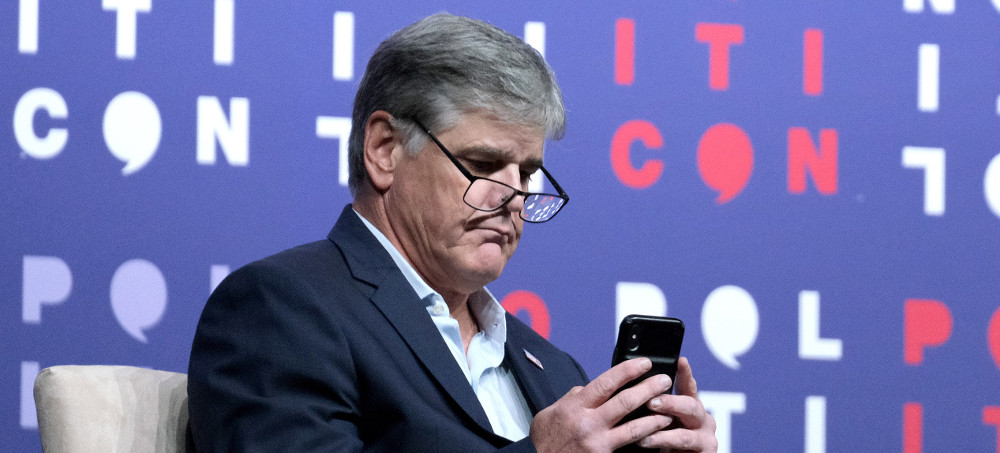Live on the homepage now!
Reader Supported News
In the texts, released by the House select committee investigating the attack, Hannity described a doomsday scenario in which the insurrection helped lift CNN over Fox in the cable news ratings contest.
“CNN will get better numbers out of this than we will,” Hannity warned Trump. “A lot of our viewers can’t watch because they’re busy rioting.”
The texts showed Hannity pleading with Trump to beseech the rioters to prevent CNN from reaping ratings gold.
“You and I are on the same page as far as undermining democracy goes, but we need to think big picture here,” Hannity wrote.
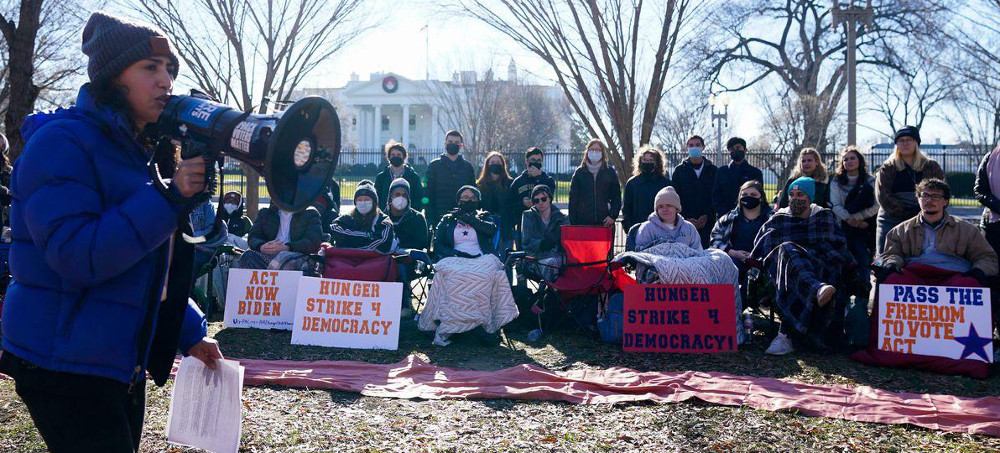 College students and recent graduates assemble near the White House during their hunger strike calling for Congress and the president to pass the Freedom to Vote Act. (photo: Un-PAC Advocacy Group)
College students and recent graduates assemble near the White House during their hunger strike calling for Congress and the president to pass the Freedom to Vote Act. (photo: Un-PAC Advocacy Group)
For months, they listened to Democrats talk about passing voting rights legislation over Republican objections. They wrote emails, canvassed and called lawmakers, urging them to protect the country’s democracy. They saw other liberal protesters marching in the nation’s capital all summer, getting arrested to bring attention to their fight.
None of it, they said, seemed to be enough.
So last week in Phoenix, a group of 20 college students and recent graduates stopped eating.
In starving themselves, they hoped politicians at the U.S. Capitol and White House would finally act with the urgency they say this crisis of democracy demands.
“We’d rather suffer through this hunger strike than to suffer the consequences of this bill not being passed,” said Brandon Ortega, a third-year student at Arizona State University who has not eaten since the hunger strike began Dec. 6. “We’re really committed to hold out as long as we can.”
The group planned to stay outside the state Capitol in Phoenix, and focus their pressure on Sen. Kyrsten Sinema (D-Ariz.) to support passing the Freedom to Vote Act, a federal voting rights bill. But to their surprise, Sinema spoke with them on Day Four. They left that meeting thinking their message needed to be elevated.
On Day Five — Friday — they flew to Washington, where new hunger strikers who heard about their protest joined them outside the White House. The group is demanding that Democrats pass federal voting rights legislation before next year, amid concern over the 2022 midterm elections.
But by Day Nine — Tuesday — their bodies seemed to be shutting down.
Too weak to walk long distances, they used wheelchairs to get to their protest spot at Lafayette Square. One hunger striker said it felt like knives were poking at her stomach. Another said she had lost more than 10 pounds. Others had to stop fasting on the advice of a doctor who checks their vital signs twice a day.
But those who were able to continue kept showing up, encouraging each other to drink water, rest and finish college assignments.
“I think my body’s just kind of like giving up on me a little bit,” said Emma Shockley, an 18-year-old freshman at the University of Pennsylvania. “It’s kind of sad that we have to do what we’re doing, but … we’re willing to do whatever it takes.”
The students are part of un-PAC, which describes itself as a nonpartisan advocacy group launched in March that employs student organizers and whose first campaign has been to pressure legislators to pass federal democracy reform legislation.
As they struggled through Day Nine, the activists received a boost from some Texas state legislators they admire: Reps. Trey Martinez Fischer (D-San Antonio), Gina Hinojosa (D-Austin) and Jasmine Crockett (D-Dallas), who is running for Congress.
“Don’t think people are not paying attention because they are. Don’t think for a minute that you’re not making an impact because you are,” Martinez Fischer told the demonstrators.
He was among the Texas Democrats who broke quorum in May to block the passage of a restrictive voting bill. That group flew to Washington to turn up pressure on President Biden and Congress to pass federal voting rights protections to override the restrictions that Republicans in Texas and other states were trying to pass.
“When the history book is written on Freedom to Vote, and on the John Lewis Advancement Act, President Biden is signing those proposals into law, we’re all going to have a chapter in that story,” he said, “and yours is happening right now.”
Kyla Frank, 23, nodded as she listened, her hands clasped atop a pink journal detailing the hunger strike. As she flipped through the pages, she pointed out notes of solidarity from speakers who encouraged the group throughout the hunger strike.
Frank has participated in the hunger strike since Day One and has been drinking about 5 liters of regular water and three bottles of electrolyte-enhanced water per day. By Day Three, she felt like she was “hit by a train.” She has lost 13 pounds.
She said she is motivated to stand up for voting rights after watching her mother work so hard to care for her and her siblings.
“A lot of the struggles that she faced are a direct result of corruption in our politics that prevents our government from protecting people who are most vulnerable,” said Frank, a graduate of the Duke Ellington School of the Arts in the District and Virginia State University.
In the last presidential election, she voted for Biden, hoping that he would fix a system she viewed as broken.
“He promised a lot of things,” Frank said. “If any of those promises are going to be seen this year, next year, we need to prioritize voting rights so people can have a pathway to getting those issues across the finish line.”
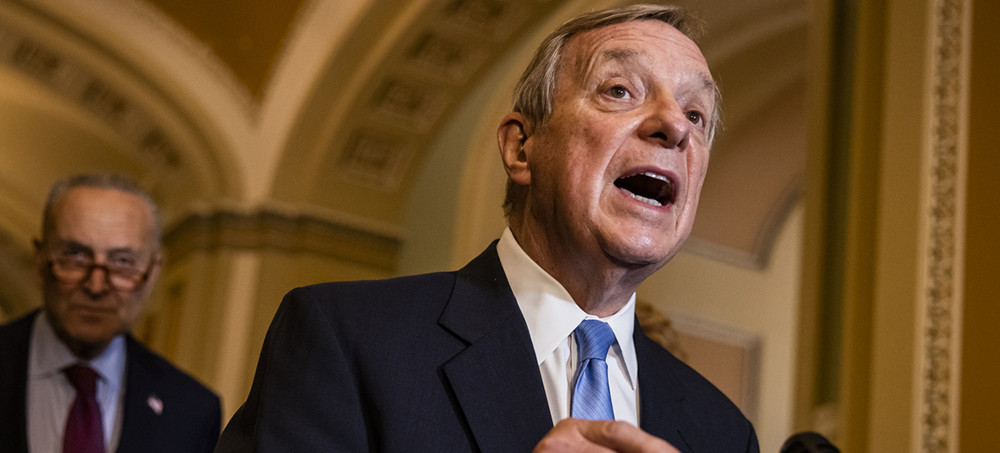 Senate Judiciary Committee Chair Dick Durbin told reporters that the decision was "disappointing." (photo: Samuel Corum/Getty)
Senate Judiciary Committee Chair Dick Durbin told reporters that the decision was "disappointing." (photo: Samuel Corum/Getty)
ALSO SEE: Democrats' Latest Attempt at Immigration Reform Is Doomed
With bipartisan immigration reform talks stalled, Democrats widely viewed the social spending bill as their best chance to enact some type of immigration reform.
The House-passed social spending bill included a provision that would extend work permits and provide temporary protection from deportation for certain undocumented immigrants who came to the United States before January 2011. But in her ruling, the parliamentarian indicated it did not comply with the chamber's rules.
Senate Judiciary Committee Chair Dick Durbin (D-Ill.) told reporters that the decision was "disappointing" and said it was not clear what plan D was "at this point." He added that the parliamentarian used the "same reasoning" as she had with previous rulings and said Democrats are "considering what options remain."
In her ruling, the parliamentarian wrote that the provision would create a new class of about 6.5 million eligible individuals, "nearly the same number of people as the previous two plans." The parliamentarian noted that "these are substantial policy changes with lasting effects just like those we previously considered and outweigh the budgetary impact."
The House proposal came after the Senate parliamentarian previously ruled that Democrats couldn’t include a pathway to legal status in their social spending bill. She also rejected a second Democratic proposal to change the date on a decades-old registry law to provide more undocumented immigrants a path to legal status.
In a statement following the ruling, Durbin, along with Senate Majority Leader Chuck Schumer and Sens. Bob Menendez (D-N.J.), Catherine Cortez Masto (D-Nev.), Alex Padilla (D-Calif.) and Ben Ray Luján (D-N.M.), said they "strongly disagreed" with the parliamentarian's decision and vowed "to pursue every means to achieve a path to citizenship" in the social spending bill.
With bipartisan immigration reform talks stalled, Democrats widely viewed the social spending bill as their best chance to enact some type of immigration reform. But the latest rejection of their efforts leaves the party with few, if any, viable alternatives. Democrats are using the so-called reconciliation process to pass the social spending bill, which allows them to evade a GOP filibuster but forces them to abide by a set of budgetary rules.
Thursday's decision is all but guaranteed to renew calls from advocates and some House members to ignore the parliamentarian's advice, which Senate Democrats likely do not have the votes for.
In a joint statement Reps. Jesús “Chuy” García (D-Ill.), Adriano Espaillat (D-N.Y.) and Lou Correa (D-Calif) said "the Senate can — and must — reinstate a pathway to citizenship in the [social spending bill], even if that means disregarding the Senate Parliamentarian and bringing that vote to the Senate floor."
Senate Republicans celebrated the decision. In a statement, Senate Judiciary Committee Ranking Member Chuck Grassley (R-Iowa) said "the parliamentarian’s ruling is just an affirmation of the obvious." He added that "trying to shoehorn radical immigration policy provisions into reconciliation has always been about avoiding bipartisan negotiation and compromise."
The parliamentarian's decision is the latest setback in a tough week in the Senate for the social spending bill and President Joe Biden's agenda. Biden acknowledged in a statement Thursday evening that the social spending bill would have to wait until next year, given the ongoing negotiations with Sen. Joe Manchin (D-W.Va.).
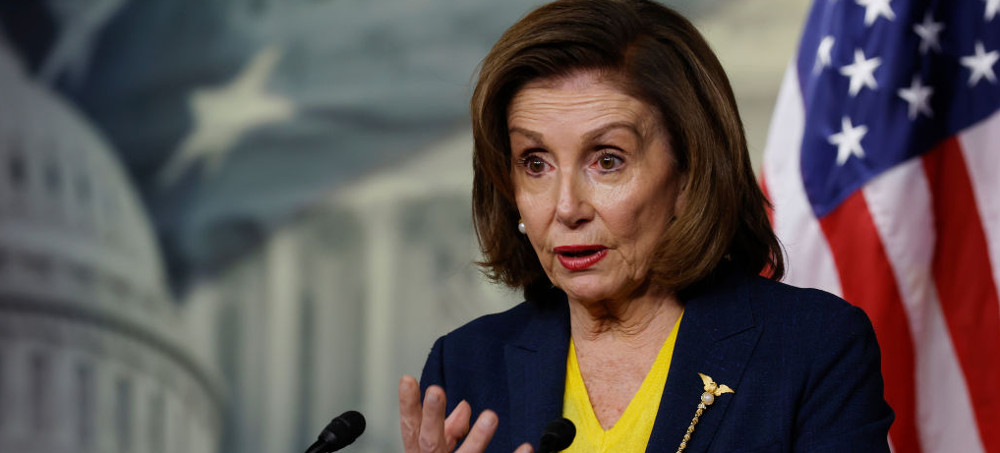 Speaker of the House Nancy Pelosi talks to reporters during her weekly news conference in the U.S. Capitol Visitor Center on December 15, 2021, in Washington, D.C. (photo: Chip Somodevilla/Getty)
Speaker of the House Nancy Pelosi talks to reporters during her weekly news conference in the U.S. Capitol Visitor Center on December 15, 2021, in Washington, D.C. (photo: Chip Somodevilla/Getty)
Thanks to her investing prowess, the Speaker of the House’s wealth grew by an estimated $16.7 million in 2020, just as millions of Americans fell into poverty and struggled to make ends meet during the COVID-19 pandemic. Long live the Queen of Stonks!
“Every single stock she has bought in the last two years has gone up significantly,” Christopher Josephs, cofounder of Iris, told Yahoo.
That’s why the Speaker of the House is our 2021 Wall Street Trader of the Year. In the halls of Capitol Hill, she might be a dove meekly brokering compromises with moderate Democrats on policy, but on the New York Stock Exchange, she’s a Gordon Gekko–like hawk unleashed, a psychic with an uncanny ability to read the market better than Warren Buffett.
The Oracle of Omaha is dead. Long live the Queen of Stonks.
To understand how Pelosi became a Wall Street mega-influencer, just look at the numbers. Since last year, she and her husband Paul Pelosi traded over $50 million in assets, with annualized returns at 69 percent as of October, according to an estimate from the Nancy Pelosi Portfolio Tracker. That’s higher than Buffett, George Soros, Cathie Wood, and other star investors of the past. Members of Congress aren’t required to provide an exact figure for the value of their assets, but Pelosi’s wealth grew by an estimated $16.7 million in 2020, just as millions of Americans fell into poverty and struggled to make ends meet during the COVID-19 pandemic. So far, 2021 is shaping up to be even nicer for Nancy.
Social media users started taking sharper notice of her trading prowess in July when Paul exercised a “call option” move that let him buy 4,000 shares of Google parent company Alphabet right before the House Judiciary Committee voted on antitrust regulations for Silicon Valley monopolists. Ka-ching! The move meant $5.3 million more for the Pelosis to add to their estimated $100 million–plus fortune.
At that time, top Democrats, Pelosi included, squawked about new federal regulations to hold the Big Four — Google, Apple, Facebook, Amazon — to account. Yet they’ve dragged their feet on bills to strengthen privacy and encourage competition in the months since then. Meanwhile, more than two-thirds of Pelosi’s stock transactions since 2020 have included those tech giants.
Fawning followers have pointed out the genius of her other moves, like purchasing hundreds of thousands of dollars in Roblox stocks when the gaming company went public in March. Many were skeptical of the value of a kids’ video game, but that stock has doubled in value since then. In July, Pelosi invested at least $1 million in computer chipmaker Nvidia, which has seen its stock skyrocket by 70 percent since then because of a worldwide chip shortage. It’s no wonder a TikTok account called @Quicktrades got 70,000 likes for a post highlighting the “queen of investing.”
Some haters, such as Senator Elizabeth Warren and Representative Alexandria Ocasio-Cortez, have called for members of Congress to be barred from playing Wall Street. “It is absolutely ludicrous that members of Congress can hold and trade individual stock while in office,” Ocasio-Cortez recently tweeted. “The access and influence we have should be exercised for the public interest, not our profit. It shouldn’t be legal for us to trade individual stock with the info we have.”
Perhaps they’re just jealous of Pelosi’s money (she’s one of the richest in Congress) and her fame among traders. When asked by a reporter on Wednesday if members of Congress should own stocks considering they get confidential briefings full of nonpublic information directly related to the price of stocks, Nancy said no.
“We’re a free-market economy,” she said. Congressmembers “should be able to participate in that.”
Her retort was reminiscent of the time Donald Trump was asked by Hillary Clinton in a 2016 debate about his years-long avoidance of federal income tax. “That makes me smart,” he said. Likewise, our 2021 Wall Street Trader of the Year is smart enough to know that conflicts of interest, appearances of corruption, and the will to regulate Silicon Valley are secondary to being Wall Street’s biggest baller.
 The logo of News Corp.'s Fox News is seen on the exhibit floor during the National Cable and Telecommunications Association (NCTA) Cable Show in Washington, on June 11, 2013. (photo: Andrew Harrer/Bloomberg)
The logo of News Corp.'s Fox News is seen on the exhibit floor during the National Cable and Telecommunications Association (NCTA) Cable Show in Washington, on June 11, 2013. (photo: Andrew Harrer/Bloomberg)
Dominion’s lawsuit, filed in March, accused Fox of trying to boost its TV ratings by amplifying false conspiracy theories that the company rigged the presidential election.
In a written ruling, Delaware court judge Eric Davis said Dominion had sufficiently alleged it was defamed by Fox News’ 2020 election coverage and the case should proceed toward trial.
“At this stage, it is reasonably conceivable that Dominion has a claim for defamation per se,” Davis said in his ruling. “Accordingly, Fox’s Motion should be denied.”
Dominion’s lawsuit, filed in March, accused Fox of trying to boost its TV ratings by amplifying false conspiracy theories that the company rigged the presidential election against Republican Donald Trump, who lost to Joe Biden, a Democrat.
Trump campaign surrogates, including lawyers Rudy Giuliani and Sidney Powell, floated conspiracy theories that Dominion rigged vote totals in the weeks after the Nov. 3, 2020 presidential election.
In a statement, a Fox News spokesperson called Dominion’s lawsuit “baseless” and said the network remains committed to defending itself.
“As we have maintained, FOX News, along with every single news organization across the country, vigorously covered the breaking news surrounding the unprecedented 2020 election, providing full context of every story with in-depth reporting and clear-cut analysis,” the Fox spokesperson said.
Dominion and Smartmatic, another election software company at the center of pro-Trump conspiracy theories, are seeking billions of dollars in damages from Trump allies they accuse of defamation, including Powell, Giuliani, and MyPillow Inc Chief Executive Mike Lindell.
In August, a judge denied motions to dismiss filed by Powell, Giuliani, and Lindell. The Trump allies continue to defend themselves in court, arguing that their remarks about Dominion and Smartmatic were free speech protected by the First Amendment of the U.S. Constitution.
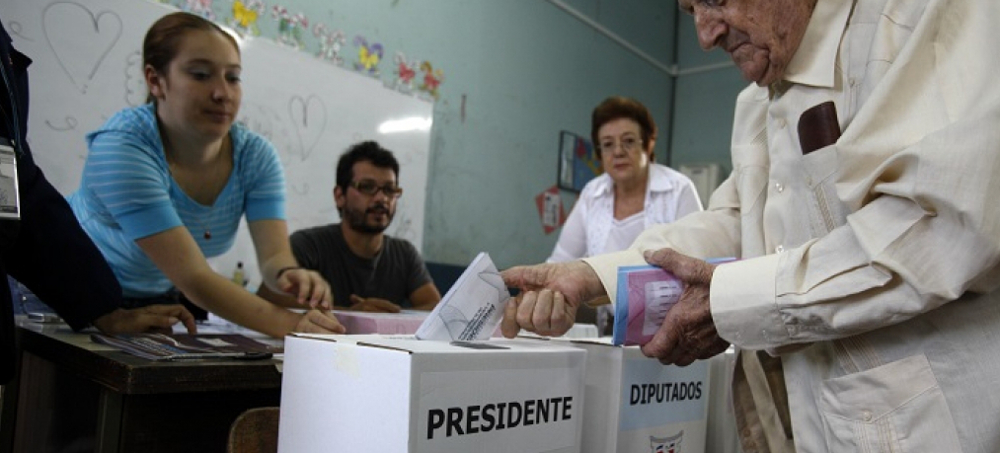 A person casts a vote in Costa Rica's 2018 elections. (photo: AP)
A person casts a vote in Costa Rica's 2018 elections. (photo: AP)
With a record number of candidates vying for president amid growing voter dissatisfaction, Costa Rica’s 2022 elections will likely uphold increasingly untenable inequality.
The pandemic alone did not bring Costa Rica’s democracy to the brink. Years of neoliberal entrenchment and political reconfigurations have fragmented the electoral playing field, while leftist politicians remain largely disconnected from the working classes. Party disaffiliation has led not only to declining turnouts, but also to increasing electoral volatility. Today, both trends converge in a country deeply fissured by social inequalities and citizen discontent. Against this backdrop, the 2022 elections are likely to favor the powerful business groups, enabling them to maintain the control of the government they achieved in 2018.
Half a Century of Bipartisanship
After the 1948 civil war, two main forces dominated Costa Rican politics: the Partido Liberación Nacional (PLN) and its opponents. Until 1978, the PLN promoted social investment and income redistribution through increasing state intervention to reduce inequalities and contain communism. The PLN encouraged anti-communist union organizing among public employees while persecuting unionism in the private sector, especially communist-led efforts. The opposition to the PLN, made up of political parties that represented the interests of the old coffee oligarchy, opposed state intervention and defended market deregulation. In 1976 these parties organized the Coalición Unidad, which was replaced in 1983 by the Partido Unidad Social Cristiana (PUSC). In elections from 1986 to 1994, the PLN and the PUSC controlled more than 97 percent of the valid votes for president.
In 1982, the PLN came to power amid a deep economic crisis. Pressured by the IMF, the World Bank, and U.S. President Ronald Reagan’s administration, the PLN government began to promote free market policies. Turning to the political right, the party increasingly resembled the PUSC. As a result, the PLN began to face growing opposition from its constituencies, particularly from public sector unions and small and medium urban and rural entrepreneurs. At the same time, the PLN was divided between supporters and detractors of neoliberalism. Although the PLN managed to stay in power in 1986, it was defeated by the PUSC in 1990. Because of these developments, José María Figueres, the PLN presidential candidate in the 1994 elections and son of the late caudillo José Figueres, based his campaign on rejecting neoliberal policies.
Although this proved to be a winning strategy for Figueres, in 1995 he signed a pact with former President Rafael Ángel Calderón, leader of the PUSC, to deepen a neoliberal agenda. When President Figueres responded to widespread popular protests against his economic policies with strong repression, a deep rift formed between the PLN and its supporters. The cost for the PLN was enormous. For the first time, it lost two consecutive presidential elections in 1998 and 2002. The political system was also seriously affected since turnout fell from around 81 percent between 1982 and 1994 to 70 percent in 1998. In the wake of several corruption scandals involving some former PUSC and PLN presidents, the two parties collectively captured only 44.5 percent of valid presidential votes in 2006. In that election, 14 political parties competed for the presidency and turnout decreased again to 65.2 percent.
The Rise of the PAC
The bipartisan crisis produced deep divisions in the PLN and the PUSC and encouraged the formation of new parties, the most important of which was the Partido Acción Ciudadana (PAC). Founded in 2000 by former PLN leaders, the PAC based its campaigns on returning to the PLN’s pre-1982 social democratic policies. Because of this, the PAC has been considered a leftist party, which it is not. In 2002, the PAC captured 26.2 percent in the presidential race, forcing the PLN and PUSC to face off in a run-off vote. It marked the first time in the country’s history that no candidate cleared the 40 percent threshold required to win the election outright in the first round. Then, in 2006, the PAC came close to winning the presidential election but was ultimately defeated by the PLN candidate, former President Óscar Arias. In an attempt to weaken the PAC, the PLN reactivated social investment, stagnant since 1990, and improved public sector salaries. This strategy allowed the PLN to win the 2010 elections with 46.9 percent, six percentage points more than in 2006.
In 2014, worn out after two consecutive terms and new corruption scandals, the PLN lost in a second-round vote to the PAC candidate, Luis Guillermo Solís. Although Solís maintained the PLN style of governing with moderate neoliberal policies and social investment, powerful business interests and their media allies soon launched a systematic campaign to demonize the state and criminalize public employees. Solís refused to promote a regressive tax reform, and in 2016, the government denounced that tax fraud amounted to 8 percent of Gross Domestic Product—nearly $5 billion per year. The business sector felt slighted, and Solís’s approval dipped. At the beginning of 2017, it seemed that the PLN would easily win the 2018 presidential election. But its nomination convention fractured the party into two tendencies: the Arismo camp, led by former President Arias, supported legislator Antonio Álvarez, and the Figuerismo faction backed former President Figueres. Although Álvarez won the nomination, he failed to incorporate the Figueristas into his presidential campaign.
According to the December 2017 polls, the presidential election was set to go to a second round between the PLN and another party. But then everything changed. In January 2018, the Inter-American Court of Human Rights issued a landmark ruling in favor of marriage equality. The decision stemmed from a 2016 request from Costa Rica for guidance on states’ obligations concerning the rights of same-sex couples. In Costa Rica, the Catholic Church and various evangelical denominations responded forcefully to the Court’s opinion, bringing a religious dimension into the electoral campaign for the first time since the end of the 19th century. Capitalizing on the situation, a small evangelical party, the Partido Restauración Nacional (PRN), advanced in the polls. As the PLN and PUSC tried unsuccessfully to compete with the PRN on matters of faith, a large section of the electorate decided to vote for the PAC.
 Conservationists are suing federal agencies over the adequacy of an environmental review that allows the killing coyotes, mountain lions and other wildlife in Nevada. (photo: unknown)
Conservationists are suing federal agencies over the adequacy of an environmental review that allows the killing coyotes, mountain lions and other wildlife in Nevada. (photo: unknown)
The move comes five years after the U.S. Agriculture Department's Wildlife Services settled a similar lawsuit by suspending the operations intended to protect livestock from predators.
WildEarth Guardians long has battled Wildlife Services over the predator management program that Congress approved in 1931 and costs U.S. taxpayers millions of dollars annually.
It allows USDA to "eradicate, suppress or bring under control" a whole host of native species, including mountain lions, bears, wolves, coyotes and bobcats, "for the benefit of agribusiness."
The New Mexico-based environmental group and the Idaho-based Western Watersheds Project filed the lawsuit Monday in U.S. District Court in Reno. It accuses the agency of failing to fully disclose or adequately analyze the impacts of its plan to expand use of aerial gunning from small planes and helicopters, poisoning and trapping of the animals on Bureau of Land Management and Forest Service lands in Nevada.
The conservationists say the agency routinely ignores the science about the efficacy of what they call a "large-scale slaughter" program, killing 1.3 million native species across the U.S. annually — the vast majority of those, coyotes.
"While society has evolved to understand the importance of native species as a key part of ecosystems and the need for coexistence of wildlife, Wildlife Services continues to rely on antiquated practices in the name of `managing' conflicts with wildlife," said Lindsay Larris, wildlife program director at WildEarth Guardians.
After WildEarth Guardians sued over the program in 2012, Wildlife Services agreed in 2016 to cease predator control activities in wilderness areas and wilderness study areas in Nevada with few exceptions for public health or safety. The settlement dictated the operations — which typically stem from ranchers' requests for action — couldn't resume until the agency fully complied with federal law.
One of the updates in the agency's July 2020 assessment is the conclusion that imperiled sage grouse would benefit from killing of predators that feed on chicks, including coyotes and ravens.
The lawsuit says that's an illegal use of the Animal Damage Control Act, which only allows the agency to do what's necessary to control "injurious animal species."
The assessment "fails to establish that ravens and coyotes are depressing or otherwise injuring populations of sage grouse," according to the lawsuit that also names the bureau and the Forest Service as defendants.
The three agencies are violating the National Environmental Policy Act and the Wilderness Act by sanctioning an impermissible "commercial enterprise" within designated wilderness areas without demonstrating lethal predator controls are necessary for a valid "wilderness purpose" or preventing serious losses of domestic livestock, the lawsuit said.
Bureau spokesman Chris Rose said in an email to The Associated Press that the agency had no comment. Neither Wildlife Services nor the Forest Service immediately responded to requests for comment.
The lawsuit says Wildlife Services doesn't review circumstances surrounding ranchers' requests to determine whether lethal means are "necessary to prevent serious domestic livestock" nor to ensure "only the minimum amount of control necessary to solve the problem will be used."
Under the new plan, Wildlife Services "must simply provide email notification to the bureau before and after conducting (such management in) bureau-managed wildernesses and wilderness study areas," the lawsuit said.
Alternatives the agency doesn't consider include temporarily curtailing livestock grazing activities in areas where the bureau has determined conflicts between livestock and wildlife often recur at the same time of year when newly born lambs and calves graze on U.S. times and native carnivores are rearing their offspring, the lawsuit said.
The lawsuit says the government also fails to adequately evaluate local impacts of predator management across nearly 9,700 square miles (25,000 square kilometers) of wilderness and wilderness study areas in Nevada. The environmental assessment said there's an "extremely high likelihood (95 to 100%)" that lethal control of wildlife will be conducted in eight wilderness areas and five study areas in Nevada over the next 10 years.
Most of the coyote killings are concentrated in only four of Nevada's 17 counties. But the government's assessment evaluates the impacts at a statewide scale across 109,826 square miles (284,448 square kilometers) "thus diluting the degree of localized effects to native ecosystems," the lawsuit said.
Between 2015-20, nearly 15,000 coyotes were killed on Bureau of Land Management lands alone in Nevada — about three-fourths in White Pine, Eureka, Elko and Humboldt counties.
Follow us on facebook and twitter!
PO Box 2043 / Citrus Heights, CA 95611

